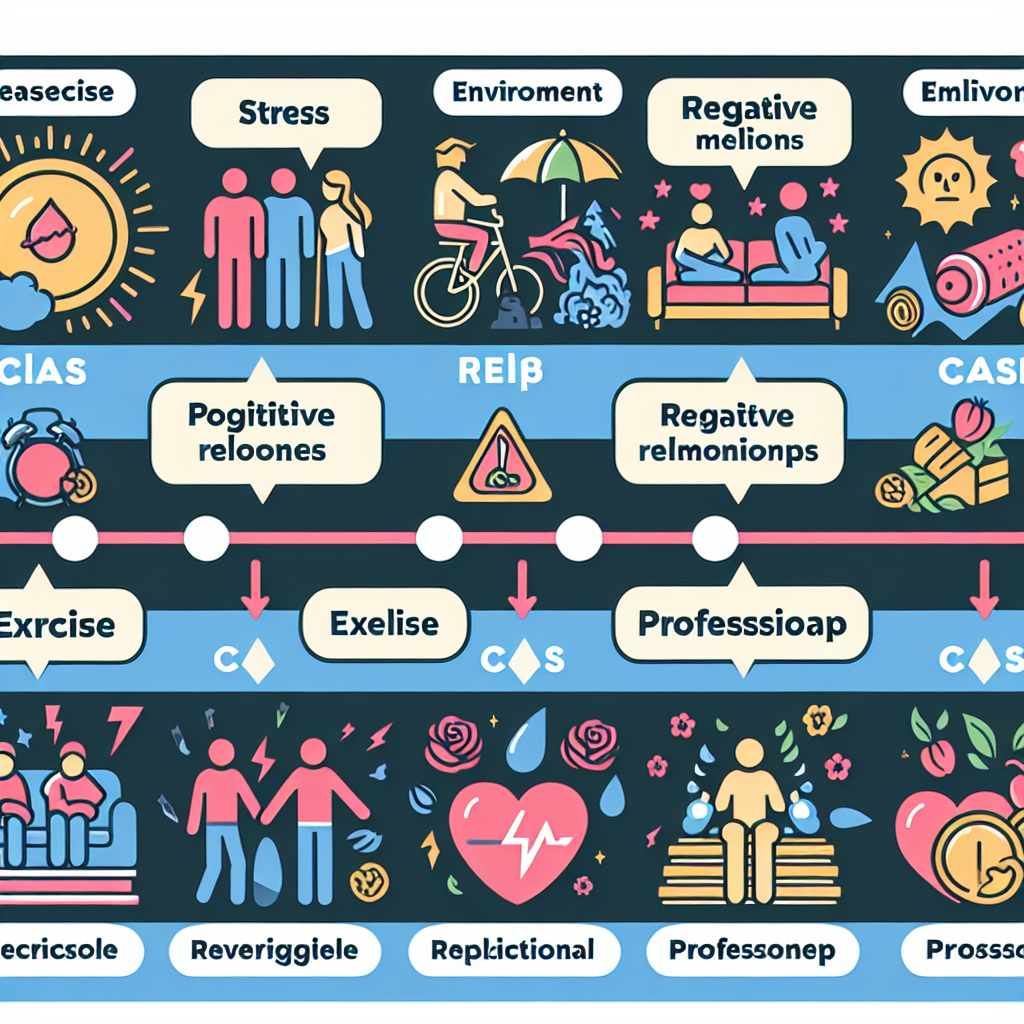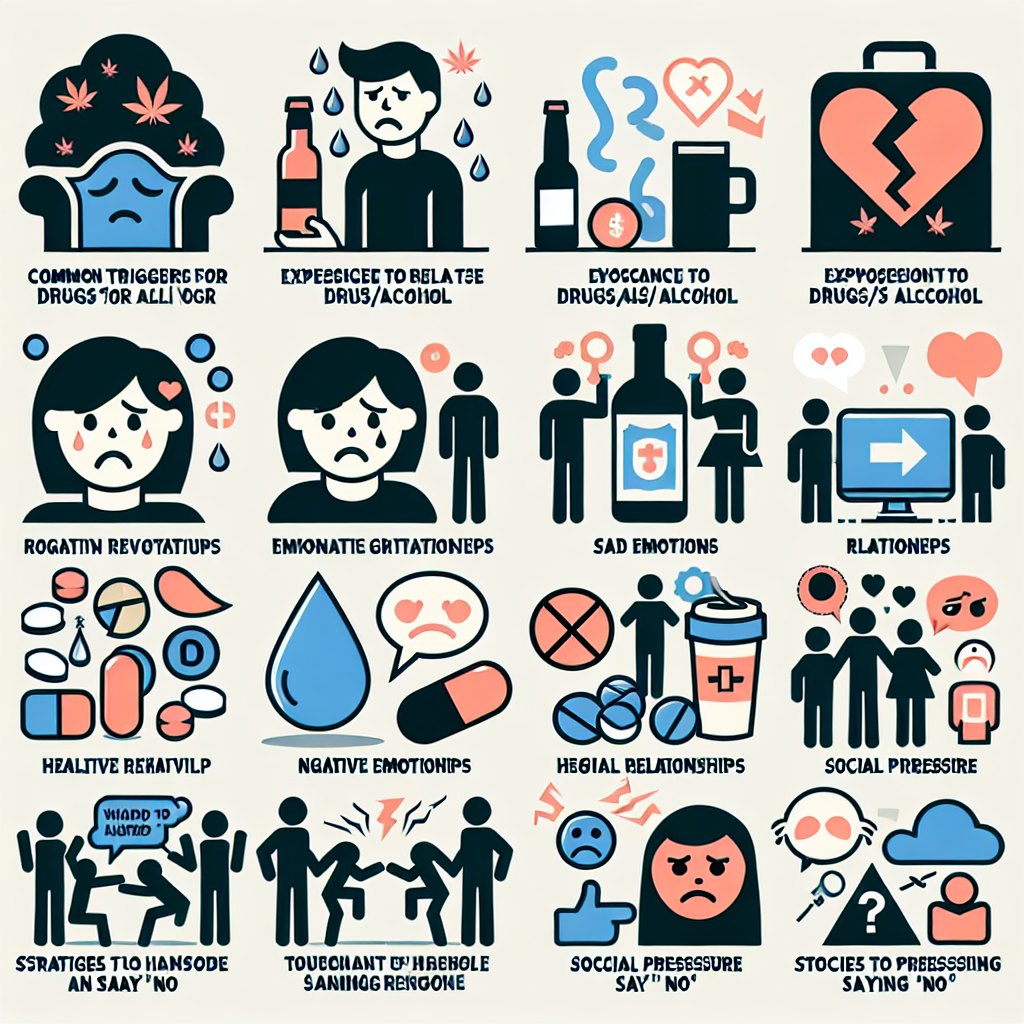-
Table of Contents

“Identify and Avoid: Recognize common relapse triggers like stress, social pressure, and negative emotions to maintain your recovery journey.”
Introduction
Relapse is a significant concern for individuals recovering from addiction, as it can undermine progress and lead to a return of harmful behaviors. Common triggers for relapse include stress, exposure to environments or people associated with past substance use, negative emotions such as depression or anxiety, and social pressures. To avoid relapse, it is crucial to develop coping strategies such as engaging in regular physical activity, seeking support from therapy or support groups, avoiding high-risk situations, and practicing mindfulness and stress management techniques. Building a strong support network and maintaining a structured routine can also help individuals stay on track in their recovery journey.
Common Triggers for Relapse and Strategies to Avoid Them
Relapse is a significant concern for individuals recovering from addiction, and understanding common triggers is crucial for maintaining long-term sobriety. One of the most prevalent triggers is stress, which can stem from various sources such as work pressures, financial difficulties, or personal relationships. When stress levels rise, the temptation to revert to old habits as a coping mechanism can become overwhelming. To combat this, it is essential to develop healthy stress management techniques. Practices such as mindfulness meditation, regular physical exercise, and engaging in hobbies can provide constructive outlets for stress relief.
Another common trigger is exposure to environments or people associated with past substance use. These can evoke powerful memories and cravings, making it difficult to resist the urge to relapse. Avoiding these high-risk situations is a proactive strategy. This might involve making new social connections, finding new places to spend time, or even relocating if necessary. Additionally, having a strong support network of friends, family, or support groups can provide the encouragement and accountability needed to stay on track.
Emotional triggers, such as feelings of loneliness, sadness, or anger, can also lead to relapse. These emotions can create a sense of vulnerability, making it easier to justify a return to substance use. Developing emotional resilience is key to overcoming these triggers. This can be achieved through therapy, where individuals can learn to process and manage their emotions in a healthy way. Cognitive-behavioral therapy (CBT), in particular, has been shown to be effective in helping individuals recognize and change negative thought patterns that contribute to emotional distress.
Boredom is another often-overlooked trigger for relapse. Without engaging activities or a sense of purpose, individuals may turn to substances out of sheer monotony. To avoid this, it is important to fill one’s time with meaningful activities. Volunteering, pursuing education or career goals, and exploring new hobbies can provide a sense of fulfillment and reduce the likelihood of relapse.
Physical health also plays a role in maintaining sobriety. Poor health can lead to discomfort and low energy levels, which can, in turn, trigger cravings. Ensuring a balanced diet, getting adequate sleep, and staying physically active are fundamental components of a healthy lifestyle that supports recovery. Regular medical check-ups can also help in identifying and addressing any health issues that might arise.
Lastly, overconfidence can be a subtle yet dangerous trigger. After a period of sobriety, some individuals may feel they have conquered their addiction and can safely return to substance use in moderation. This mindset can quickly lead to a full-blown relapse. It is important to remain vigilant and humble, recognizing that addiction is a chronic condition that requires ongoing management. Continuous participation in support groups and ongoing therapy can help maintain this awareness and provide a safety net.
In conclusion, while the journey to recovery is fraught with potential triggers for relapse, understanding and addressing these triggers can significantly enhance the chances of long-term sobriety. By managing stress, avoiding high-risk environments, building emotional resilience, staying engaged in meaningful activities, maintaining physical health, and remaining vigilant against overconfidence, individuals can navigate the challenges of recovery with greater confidence and success. The path to sobriety is not easy, but with the right strategies and support, it is entirely achievable.
Identifying and Managing Relapse Triggers: A Comprehensive Guide
Relapse is a significant concern for individuals recovering from addiction, and understanding common triggers is crucial for maintaining long-term sobriety. Triggers can be internal or external stimuli that provoke cravings or thoughts of using substances again. By identifying these triggers and implementing strategies to manage them, individuals can significantly reduce the risk of relapse and continue on their path to recovery.
One of the most common triggers for relapse is stress. Life’s pressures, whether related to work, relationships, or personal challenges, can create overwhelming feelings that may lead individuals to seek solace in substances. To avoid this, it is essential to develop healthy coping mechanisms. Techniques such as mindfulness meditation, regular exercise, and engaging in hobbies can help manage stress levels. Additionally, seeking support from friends, family, or a therapist can provide a valuable outlet for discussing and alleviating stress.
Another prevalent trigger is exposure to environments or people associated with past substance use. These external cues can evoke powerful memories and cravings. To mitigate this risk, it is advisable to avoid places and social circles that were part of the substance use lifestyle. Instead, building a new, supportive network of friends who encourage sobriety can make a significant difference. Attending support groups, such as Alcoholics Anonymous or Narcotics Anonymous, can also provide a sense of community and accountability.
Emotional triggers, such as feelings of loneliness, sadness, or anger, can also lead to relapse. These emotions can be particularly challenging because they are a natural part of the human experience. However, learning to process and express emotions in a healthy way is key. Journaling, talking to a trusted friend, or engaging in creative activities like painting or music can help channel emotions constructively. Moreover, practicing self-compassion and recognizing that it is okay to feel these emotions without resorting to substance use is vital.
Physical health plays a significant role in maintaining sobriety as well. Poor sleep, inadequate nutrition, and lack of exercise can weaken an individual’s resolve and make them more susceptible to cravings. Establishing a routine that includes a balanced diet, regular physical activity, and sufficient rest can enhance overall well-being and resilience against relapse. Additionally, regular medical check-ups can help address any underlying health issues that might contribute to the urge to use substances.
Boredom is another often-overlooked trigger for relapse. When individuals have too much idle time, they may be tempted to fill it with old habits. To counteract this, it is important to stay engaged in meaningful activities. Volunteering, pursuing educational opportunities, or taking up new hobbies can provide a sense of purpose and fulfillment. Setting short-term and long-term goals can also keep individuals focused and motivated.
Lastly, overconfidence in one’s ability to stay sober can be a subtle yet dangerous trigger. Believing that one is completely immune to relapse can lead to complacency and risky behaviors. It is crucial to remain vigilant and continuously practice the strategies that support sobriety. Regularly attending support meetings, staying connected with a sponsor or mentor, and continually educating oneself about addiction and recovery can help maintain a proactive approach.
In conclusion, identifying and managing relapse triggers is an ongoing process that requires self-awareness, support, and proactive strategies. By recognizing the common triggers such as stress, environmental cues, emotional challenges, physical health, boredom, and overconfidence, individuals can take concrete steps to avoid relapse. Embracing a holistic approach to recovery, which includes mental, emotional, and physical well-being, can inspire and empower individuals to maintain their sobriety and lead fulfilling lives.
Q&A
1. **Question:** What are common triggers for relapse in addiction recovery?
**Answer:** Common triggers for relapse include stress, exposure to environments or people associated with past substance use, negative emotions like depression or anxiety, and social pressures.
2. **Question:** How can relapse triggers be avoided in addiction recovery?
**Answer:** Relapse triggers can be avoided by developing healthy coping mechanisms, avoiding high-risk situations, seeking support from therapy or support groups, and creating a structured daily routine.
Conclusion
Common triggers for relapse include stress, exposure to environments or people associated with past substance use, negative emotions, and social isolation. These triggers can be avoided by developing healthy coping mechanisms, maintaining a strong support network, avoiding high-risk situations, and engaging in regular therapy or support groups. Additionally, creating a structured daily routine and practicing mindfulness or relaxation techniques can help manage stress and reduce the risk of relapse.



